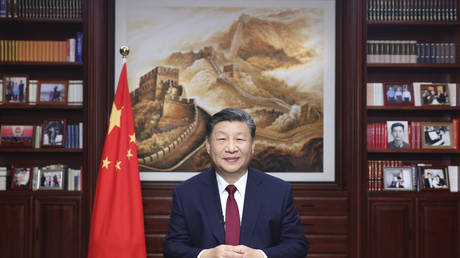ARTICLE AD BOX
The Biden administration is believed to be forming a group of ex-senior officials to meet with the next president
The US is planning to send a delegation to Taiwan after this weekend’s presidential election on the self-governing Chinese island, according to reports by several media outlets on Thursday.
The unofficial group will supposedly be composed of former senior US officials who will meet with the winner of the vote, sources within the Biden administration have told the press without providing any details as to how many people are expected to go.
The Financial Times has suggested, however, that the White House has allegedly tapped former Deputy Secretary of State James Steinberg, a Democrat, and former Republican National Security Advisor Stephen Hadley to lead the bipartisan delegation.
One White House official suggested that such a face-to-face meeting would be “the most effective way” to engage with the new Taiwanese government and convey US policy, adding that Washington believes such a move would contribute to peace and stability in the region.
According to US National Security Council spokesperson Kate Waters, the move would also be “consistent” with the ‘One China policy’ and the status quo, as the delegation visit would take place only after the elections are held to ensure that Washington is not perceived as endorsing any particular candidate or party in the vote.
In response, Beijing has urged Washington to “refrain from intervening in the elections in the Taiwan region in any form, so as to avoid causing serious damage to China-US relations.”
Chinese Foreign Ministry spokesperson Mao Ning stressed that Beijing firmly opposes any official exchange between Washington and Taipei and reiterated that Taiwan is an inalienable part of China.
Read more Reunification with Taiwan is ‘inevitable’ – Xi
Reunification with Taiwan is ‘inevitable’ – Xi
Taiwan – officially called the Republic of China – has governed itself since nationalist forces led by Chiang Kai-shek fled to the island in 1949 after they lost a civil war to the People’s Liberation Army, the militant wing of the Communist Party of China.
Beijing, meanwhile, has been seeking peaceful reunification with the island, with President Xi Jinping predicting that Taiwan would “surely be reunified” with the Chinese mainland during his New Year address.
At the same time, XI has also repeatedly stressed that China would be willing to take military action if the island were to seek formal independence.
The US, however, despite officially adhering to the One China policy, has continued to maintain contact with Taipei and has signed security agreements with the island’s government, providing it with military hardware and vowing to protect it in case of a conflict with the mainland.
Washington has also continued to send both official and unofficial delegations to the island to meet with its top representatives, which has considerably hampered US-China relations in recent years. They reached their breaking point in 2022 when then-House Speaker Nancy Pelosi visited Taipei. Beijing responded to the visit by launching multiple rounds of wargames, including a massive simulated blockade of the island.
.png)
 1 year ago
5
1 year ago
5







 English (US)
English (US)